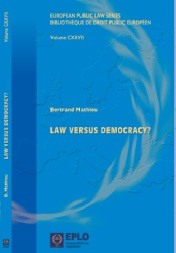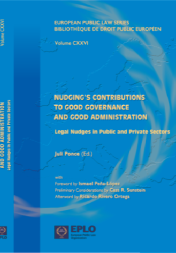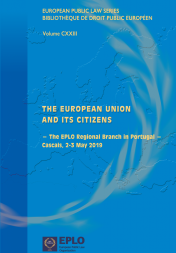
Fouskas, Theodoros (Ed.). Immigrants, Asylum Seekers and Refugees in Times of Crises: B. An International Handbook on Migration, Asylum, Social Integration and Exclusion (Foreword by Marco Martiniello), European Public Law Series / Bibliothèque de Droit Public Européen, vol. CXXV, European Public Law Organization (EPLO), Athens, 812 pp., 2021, ISSN: 2308-8648, ISBN: 978-618-5417-10-9 (SET), ISBN: 978-618-5417-12-3 (B)
Prompted by economic uncertainties, socio-political instabilities, wars, persecutions or environmental changes, migrants seek refuge, safety and hope via perilous routes and journeys. Beyond responses to crises there is an important aspect of migration, especially in a long-term perspective, that requires sustainable, long-lasting solutions: the social integration of immigrants and refugees. Immigrants, Asylum Seekers and Refugees in Times of Crises: B. An International Handbook on Migration, Asylum, Social Integration and Exclusion offers a distinctively global, intersectional and multi-disciplinary approach to migration, gender, social class, race and ethnicity, awareness-raising and empowerment and an analysis of challenges regarding immigrant and refugee integration and social exclusion from domains of integration. Lack of employment, education, housing, access to services, healthcare and social interaction leads to isolation, marginalisation and social exclusion of immigrants and refugees from many aspects of life. Scholars from North America, Europe, Africa, Asia and Oceania in the field of Immigration and Refugee Studies from a broad range of disciplines, provide understandings on key issues of international migration and immigrant and refugee inclusion in reception societies. They delve into institutional and everyday practices of migrant and refugee rights as well as opportunities and life chances in order to shed light on necessary background knowledge and tools to chart current and future trends in research on migration and integration policy, inclusion at local level, and national and global migration governance. The Handbook is structured into seven central sectors:
- Approaches to migration policy, social integration and exclusion.
- Labour market, exploitation and precarious work.
- Religious and racial boundaries, racism and nationalism.
- Media discourse on migration and the coverage of the “migrant and refugee crisis”.
- Access to education.
- Ηousing, welfare, gender and family.
- Health care and mental health support.
The Handbook responds to the need for a better understanding of the contrasting differences across experiences in integration domains such as employment, housing, education, social welfare, healthcare, intercultural coexistence and issues that significantly inhibit or enhance integration. Immigrants, Asylum Seekers and Refugees in Times of Crises: B. An International Handbook on Migration, Asylum, Social Integration and Exclusion provides a range of perspectives and insights into central topics and debates in the field of social integration. It is a definitive publication and a useful source for academics, students and researchers across social and political sciences, human rights and other disciplines, policymakers and professionals working on migration and asylum.
Contents
Editor and Contributors
Acknowledgments
Marco Martiniello, Foreword
1. Theodoros Fouskas, Introduction: From Reception to Integration of Migrants and Refugees?
2. Uma A. Segal, On the Integration of Immigrants and Refugees: A Contemporary Commentary
3. Melissa Phillips, Cautionary Tales from the Geographic South: The Impact of Australia’s ‘Worst-Practice’ on International Policy-making towards Asylum Seekers and Refugees in Times of Crisis
4. Edoardo Bressanelli / Stella Gianfreda, From EU Citizens to EU Migrants: Mapping the Changing Status of EU Nationals in post-Brexit Britain
5. Dionyssis Balourdos / Maria Petraki, Immigrant Multidimensional Poverty in Europe
6. Stefanos Spaneas / Agamemnonas Zachariades / Despina Cochliou, Cyprus Assisted Voluntary Return Programme: Developing a Sustainable Pre-Departure Policy
7. Paraskevi Naskou-Perraki / Christos Baxevanis, EU’s Response to Refugee Crisis: The EU-Turkey Statement
8. Antonis Kontis, The Migration Policy of Greece
9. Valerie Preston / Brian Ray, Gender, Race, and Second Generation Labor Market Outcomes in Toronto, Canada
10. Sona Kalantaryan, Labour Market Integration of Humanitarian Migrants during the Economic Downturn
11. Amanda De Lisio, On Sex in the City of God
12. Robert Westermann, Local Governance of Super-Diversity - The Role of Occupational Orientation
13. Jenna Hennebry / Janet McLaughlin / Anelyse M. Weiler, Fresh Food, Stale Schemes: Comparing Agricultural Labour Migration in Canada and Spain
14. Silvia Giulini / Sebene Eshete, The Life of Migrant Agricultural Workers in Nea Manolada and Filiatra
15. Iris Polyzou, Aspects of Immigrant Commerce in the Centre of Athens: Geographies and Practices in the Establishment of a Business
16. Nancy Foner, Is Islam in Western Europe like Race in the United States?
17. Tao Xu, Economic and Cultural Threats and Chinese Residents’ Attitudes Toward Foreigners in Yiwu, China
18. Alena Kluknavská / Manuela Caiani, Populist Radical Right and Immigrants in Times of Crisis: The Case of the Czech Republic and Slovakia
19. Chia-Ling Yang, Experiencing and Practicing Racism in Sweden: Chinese Migrants at the Crossroads
20. Jussi P. Laine, Media Sensationalism and the Production of the Crisis: Exploring the Normative Terrain of Migration Journalism
21. Alina Rzepnikowska, Polish Migrants in Britain and Spain: The Media and Political Discourses
22. Jeffrey Jurgens, The Affective Work of “Crisis”: Pluralism, Citizenship, and Racialization in Germany
23. Stephanie Bengtsson, But Some are More Equal than Others: Understanding the Global Education Response for Refugees and Migrants
24. Ourania Miliou / Charalambos Vrasidas, Supporting Migrant Integration with Digital Technologies: Case Studies from Cyprus
25. Daniele Karasz, “That’s Us, the Foreigners, Who Else?” – The Non-definition of Migrants in a Developer’s Competition for “Intercultural” Housing Estates and the Consequences for Housing Allocations
26. Eva Anna Duda-Mikulin, Access to Social Welfare as a Facilitator of Migrant Women’s Gender Roles
27. Katerina Vassilikou, Family Mobility, Migrant Networks and Domestic Work in Times of Recession
28. Nathalie Simonnot / Pierre Chauvin, Migrants Seen by Doctors of the World across Europe: A Mix of Legal Residents, Undocumented Immigrants and Migrants in Transit who Share Common Harsh Living Conditions and Barriers in Accessing Health Care
29. Maria Psoinos / Elisabeth Ioannidis / Dimitris Papamichail / George Koulierakis, Effective Synergies between Civil Society and Public Sector: The Case of Healthcare for Migrants and Refugees in Greece
30. Eleni Hatzidimitriadou, Mental Health, Trauma and Wellbeing of Forced and Other Migrants: Effective Responses at Times of Crisis
31. Theodoros Fouskas / Charalampos Economou / Joana Vassilopoulou / Despina Papadopoulou / Gerassimos Karabelias / Kyriakos Souliotis / Athanassios Vozikis / Symeon Sidiropoulos / Konstantinos Kazanas, A Tale of Two Crises: Reception Policy and Covid-19 Management regarding Migrants, Asylum Seekers and Refugees in Greece





















